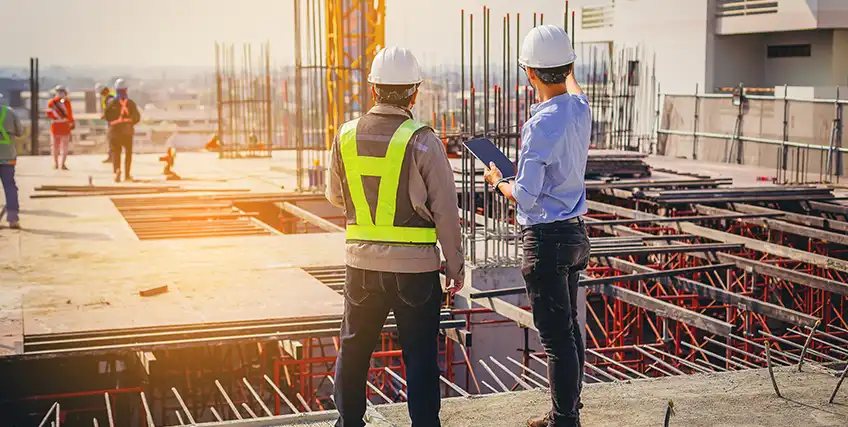How to Get Construction Loan Financing
March 03, 2025 | Last Updated on: March 03, 2025

Guide to Construction Loan Financing for Business
If you want to expand your business or fulfill a specific vision, you may turn to new construction. Though plenty of commercial real estate options exist, some businesses can benefit from building from the ground up. For example, those in hospitality building a hotel or large companies building a modern, state-of-the-art warehouse. Construction gives you a blank canvas to work with, so you have the freedom to do what you want. But it comes with a hefty cost, and you likely need construction loan financing to get started.
Article Summary:
- Construction loan financing provides loans to help build commercial property from scratch.
- Banks and alternative lenders offer construction loans, which have higher rates and shorter repayment terms.
- There are different types of construction loans, which provide funds in “draws” on a specific schedule.
What Is Construction Loan Financing?
Construction loan financing refers to taking out loans for construction projects. These types of loans are specifically for the purpose of construction, or in some cases, renovations. Construction financing options are typically short-term, meaning you have a shorter runway to repay the loan. For example, some can be as low as six months.
What differentiates loans for construction projects from other loans is that you may only need to make interest-only payments during the construction phase.
How Construction Loan Financing Works
The way construction loans work isn’t the same as a traditional loan. Instead of getting a lump sum, the disbursement of funds comes in installments or “draws” once certain milestones are met. Your first draw may be to purchase the land, another might be site development or after the foundation is set. An inspector may help to verify that the appropriate stage is complete before you get your next draw.
Since construction loan financing is short-term, you may have six months up to several years to pay off the loan. However, it may be possible to transition to permanent financing. This essentially turns your short-term loan into a long-term one and is treated as a mortgage loan.
Which Construction Costs Are Covered by a Construction Loan?
Using construction loan financing, you can pay for:
- Land
- Building materials
- Equipment
- Land development
- Payroll
- Labor costs
Be sure to talk to lenders about what you can and can’t use the construction loan for and any potential fees associated with it.
Types of Construction Loans
Multiple loan options are available from lenders including banks, credit unions, and construction financing companies. Each lender may have different minimum and maximum loan amounts and repayment terms. Review your options based on your needs.
Construction-Only Financing
Through construction-only financing, you have a short-term and get funds only for the construction of your new building. The funds are released in stages when various milestones are met. During the construction period, you’re typically only on the hook for interest-only payments.
Repayment terms on construction loan financing can range from six months to three years . So, within that time frame, you must repay the lender. If you’d like to extend the repayment term upon completion of the project, you can refinance the loan into a permanent mortgage.
Construction-to-Permanent Loan
A construction-to-permanent loan combines the convenience of a construction-only loan with the longer repayment term of a conventional mortgage. You only pay any accrued interest during the construction phase. When the construction is complete, the loan converts to a longer-term 15 or 30-year mortgage. Since you’re getting two-in-one financing here, you pay closing costs only once.
SBA Loans
The federal government has an entire agency supporting small business owners, appropriately named the Small Business Administration (SBA). Aside from a range of resources, the entity provides government-backed loans. Some SBA loans may be used for construction loan financing. These loan programs include.
- SBA 504 loans: A 504 loan from the SBA has a maximum loan amount of $5.5 million and can go toward purchasing land or constructing new facilities.
- SBA 7(a) loans: A 7(a) loan has a maximum loan amount of $5 million. Funds can go toward acquiring, refinancing, or improving real estate, according to SBA.gov.
The 504 loan offers fixed rate financing, which provides predictable monthly payments. The 7(a) loan may have a fixed rate or a variable or an adjustable rate that fluctuates based on certain economic factors. To qualify for SBA loans, your business must meet certain sizes and other eligibility requirements.
How to Get Construction Loan Financing
To get construction loan financing, you’ll need to find a lender who offers this type of product. You can chat with a loan officer from a bank or review options from alternative lenders.
Loans for construction projects are more challenging to get as there are more variables involved and higher levels of risk. Lenders will do their due diligence to ensure you’re a qualified candidate for the loan. You’ll likely need to provide:
- Construction plans and project description
- Budget for construction project
- Building plans
- Experienced builder
- Building materials
- Permits
- Contracts for workers on the project (such as a general contractor and an architect)
- Builders risk insurance policy (it’s recommended to get enough to cover the cost of the entire construction project)
- General liability insurance
- Project timeline
To qualify for construction loan financing, you typically must meet strict underwriting criteria.
- Credit score: To be eligible for any loans for a construction project and secure competitive construction loan rates, you need a strong credit score. Some lenders may accept as low as 680, however in the 700s or above is ideal. Checking both your personal and business credit reports is a smart idea before applying for any loans. You can check your personal credit reports with Experian, Equifax, and TransUnion. Business credit reports are available from Experian, Equifax, and Dun & Bradstreet.
- Down payment: Some lenders may require a 10% to 30% down payment for a construction loan. So, make sure you have money on hand if applying for a construction loan. Having a large down payment can help if you’re applying for construction loan financing. The size of your down payment typically varies by lender and the type of construction project.
- Debt-to-income ratio (DTI): Your debt-to-income ratio is often an indicator of your financial health. It’s the percentage of your income relative to your overall debt. Lenders look at this percentage to help decide the likelihood you can repay the loan. Many lenders don’t want a DTI that exceeds 43% . So, if you can keep your DTI below 43%, you’ll be in better shape.
- Debt service coverage ratio (DSCR): Another metric used is the debt service coverage ratio or DSCR. This looks at the property’s net income in relation to the debt obligations. According to Avana Capital, construction loan lenders typically want a DSCR of 1.4 or higher to ensure you have enough room to comfortably cover your loan payments.
- Loan-to-cost: Your loan-to-cost or LTC measures the size of the loan relative to the cost of the construction project.
- Loan-to-value: The loan-to-value or LTV looks at the size of the loan relative to the overall value once the construction project is done.
- Experience and time in business: . Lenders will also evaluate your business history when applying for a construction loan. Having many years under your belt and a solid history showing that your business is profitable make you seem less risky compared to someone with a new business. Additionally, lenders typically want proof that you have a successful track record. So, having your portfolio, case studies, testimonials, and financial statements ready can make or break your application.
Some documents you might need when applying for construction loan financing include:
- Profit and loss statement
- Cash flow statement
- Business tax returns
- Personal tax returns
- Balance sheet
- Financial projections
- Business plan
As you shop around from lenders, you can see if the financial institution or lender offers preapproval for the loan. You can look at options from your bank or credit union or an online lender. Check the eligibility requirements and have everything ready before submitting your application.
Final Thoughts
Construction loan financing can help business owners create their own commercial space to their specifications. It can be costly and time-consuming to start from scratch, but with the right tools and resources, you can get started and execute your vision. Budget in extra time and funds as construction is prone to delays, especially due to uncontrollable factors like weather. Having a plan and preparing for different possibilities can smooth out the process.
FAQs About Construction Loan Financing
How Much is Required Down for a Construction Loan?
To qualify for commercial construction financing options, you typically must provide a 10% to 30% down payment. You may need to provide some form of collateral, which is an asset to secure the loan. In some cases, the actual land and the finished building act as collateral on a construction loan.
What Are the Pros and Cons of Construction Loan Financing?
Construction loans can help you with building your dream home or getting a commercial space off the ground. However, they come with steep interest rates and shorter repayment terms . One of the advantages is that you typically make interest-only payments during the building process.
Are Loans for Construction Projects Harder to Get?
Getting loans for construction projects can be more difficult than other types of loans. Since there’s not a home you can initially use as collateral to secure the loan, construction loan financing is riskier and has stricter underwriting requirements.
What Credit Score is Needed for a Construction Loan?
To qualify for construction loan financing, you typically need a minimum credit score of 680. For the best construction loan interest rates, 700 or above is ideal . Each lender sets their own minimum credit score requirements. Typically, you’ll also need to provide a personal guarantee which means that you’re responsible as an individual, as opposed to the business, for any payments in the event of default.
Can SBA Loan Be Used for Construction?
Yes, an SBA loan can be used for construction loan financing. The SBA 504 loan allows borrowers to use funds to purchase land or construct new facilities. The SBA 7(a) loan can be used for the purpose of acquiring and improving real estate, according to SBA.gov.
What Types of Property Can You Build with a Construction Loan?
You may be able to build a retail store, mixed-use building, hotel, office, or industrial warehouse with a construction loan. The exact use will vary by lender. Some homebuyers use a construction loan to build their dream home.
What Is the Difference Between a Personal Construction Loan and a Commercial Construction Loan?
A personal construction loan is for an individual who wants to build a new home rather than buy an existing home. A commercial construction loan is for businesses that want to build a commercial space, such as an office or hotel.




